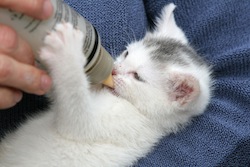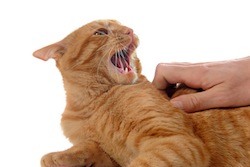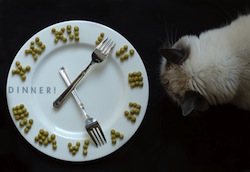Urinary dirtiness associated with a developmental disorder
 Urinary dirtiness in the cat sometimes follows an event During its first months of life, event having failed to follow a very normal development.
Urinary dirtiness in the cat sometimes follows an event During its first months of life, event having failed to follow a very normal development.
This type of dirtiness concerns, most often, of adopted very young kittens (kitten whose mother died and raised the bottle, kittens weaned and separated from their mothers too quickly and did not finish their education with her…)
It can result only from a simple learning default but can also be associated with a more boring developmental disorder as in the syndrome cat "hypersensitive, hyperactive". Other symptoms indicative of this disorder are systematically present in addition to the filth.
Learning disability
¤ A kitten is generally clean from the age of three weeks.
He becomes imitation of her mother : he learns naturally like her to do his business away from its rest area and the place where he takes his meals.
¤ This learning by imitation can not take place if the kitten :
– Was raised in a small space or very dirty or without litter that does not allow him to define distinct areas for sleep, food, to relieve oneself…
– A very young was separated from his mother for some reason
– Was raised by a mother who herself exhibited uncleanliness disorders
It is then quite difficult, thereafter, to teach these kittens to defecate in a litter.
¤ Prevention of these learning disorders can be done by adopting kittens minimum two months, raised by a cat clean itself.
¤ When it comes to a young orphan cat or higher in an unsuitable environment :
– The distribution of rewards (food, caresses) when the cat has agreed to do in the litter may motivate him to always do at this point
– A clean and perfectly balanced adult cat placed his company will secure learning by imitation, which could not take place with mom (This adult cat may as well be a male than a female)
Hypersensitivity Syndrome / hyperactivity
¤ definition
The response threshold to a stimulus is established during development of the animal in the first three months of his life. This response threshold depends directly on the conditions in which the kitten is high :
A cat educated in ideal conditions learns, with his mother, to respond "normally" to a given stimulus and control is (especially during games or in contacts…)
When the kitten :
– was not brought in contact with his mother (kitten adopted before 2 month, booze…)
– grew up in an environment little stimulating or otherwise hyperstimulant during his first weeks
– had a mother who herself had behavioral problems;
it can develop a syndrome says "hypersensitivity / hyperactivity"
¤ Symptoms
The syndrome "Hs / Ha" is characterized by many symptoms and uncleanliness is far from the only encountered behavioral abnormalities in an animal that suffers.
This kitten is excessive at all.
This is an animal :
hyperactive :
its engine behavior is exacerbated.
– It moves all the time, climbs, reverses all objects placed on furniture, the shelves, sleeps badly at night…His excitement is often even more pronounced in the evening where he seems to take genuine "fits of madness".
– He is unable to control the game : he can not play without scratching or biting. The wounds it inflicts are in no voluntary but the result of his inability to control himself when he goes up in excitement…
– It tolerates very little coercion : he can not stand being mistaken arms, that the brush or which administers drugs…
It shows its claws, yells, and trying to bite as soon as the handles.
– It may also suffer from a lack of food control : He then flies food regularly and can swallow foreign bodies.
hypervigilant :
– He jumps at the slightest noise
– It needs a presence for reassurance and follows his master everywhere, All the time.
hypersensible :
This is a particularly anxious animal : This anxiety can be demonstrated by :
– of uncleanliness (cat urine other than his litter at the slightest provocation),
– incessant meowing
– or excessive grooming, the cat licking with constantly insistence.
In response to these abnormal behaviors (especially against the aggressiveness of these cats and filth they frequently present), these animals are often poorly integrated into the family, rejected…
This rejection increases their anxiety and a vicious circle is established then : the cat urine because it is anxious, he is punished, these punishments increase anxiety and therefore uncleanliness…
¤ Treatment
Treatment involves significant changes to appease the animal
– all punishment must be absolutely prohibited : it only adds to the stress of the cat and therefore uncleanliness (avoid shouting, take the cat by the scruff of the neck or put force in the litter, This will only result in the disgust of this place)
– The living environment the animal will enriched maximum : different game hunting and exploration (cat tree, mouse, ball, mobiles, piles of cardboard or other hiding places…) will be offered to him. These games will be changed regularly by performing a ball to prevent the cat get tired.
– The food must be available all day to avoid any additional stress to food linked.
If the cat is overweight, games gradually releasing croquettes be offered (they allow him to eat his daily ration slowly and are a fun activity that allows him to have access to food all day)
– Therapy controlled game : any phase of the game should be stopped when the cat goes up in excitement (jerky beats of the tail, marked dilatation of the pupils cat ...)
– In addition to environmental changes, Employment pheromones and food supplements with soothing can help decrease anxiety cat hypersensitive / hyperactive
– Finally, Your veterinarian may add to environmental changes such a medical treatment to reduce anxiety cat, help gain some control in the game and calm aggression.
§
A cat who did not receive an education balanced by an adult cat over its 2 first months of life can have significant behavioral problems later. these disorders (aggressiveness, intolerance in contact, malpropreté, scratches and bites during the games…) are all the more difficult to understand and accept the owners that this particular small high cats Bottle, "Fragile little beings" to whom they have spent a lot of their time…
It is not "normal" a cat claw you or bite you violently when he plays, he refuses to be touched, or that urine constantly everywhere. Such conditions should promptly be reported to your veterinarian for seeking solutions with you and try to avoid rapid deterioration of relationships you have with your pet.


